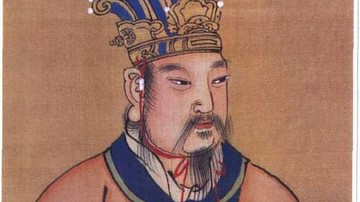Search
Search Results

Definition
Sargon of Akkad
Sargon of Akkad (r. 2334 - 2279 BCE) was the king of the Akkadian Empire of Mesopotamia, the first multi-national empire in history, who united the disparate kingdoms of the region under a central authority. He is equally famous today as...

Definition
Ancient Persian Culture
Ancient Persian culture flourished between the reign of Cyrus II (The Great, r. c. 550-530 BCE), founder of the Achaemenid Persian Empire, and the fall of the Sassanian Empire in 651 CE. Even so, the foundations of Persian culture were already...

Definition
Mandate of Heaven
The Mandate of Heaven (Tianming), also known as Heaven's Mandate, was the divine source of authority and the right to rule of China's early kings and then emperors. The ancient god or divine force known as Heaven or Sky selected a particular...

Definition
Heian Period
The Heian Period of Japanese history covers 794 to 1185 CE and saw a great flourishing in Japanese culture from literature to paintings. Government and its administration came to be dominated by the Fujiwara clan who eventually were challenged...

Definition
Seleucid Empire
The Seleucid Empire (312-63 BCE) was the vast political entity established by Seleucus I Nicator ("Victor" or "Unconquered", l. c. 358-281 BCE, r. 305-281 BCE), one of the generals of Alexander the Great who claimed a part of his empire after...

Definition
Ancient Persian Religion
Ancient Persian religion was a polytheistic faith which corresponds roughly to what is known today as ancient Persian mythology. It first developed in the region known as Greater Iran (the Caucasus, Central Asia, South Asia, and West Asia...

Definition
Rashidun Caliphate
The first four caliphs of the Islamic empire – Abu Bakr, Umar, Uthman, and Ali are referred to as Rashidun (rightly guided) Caliphs (632-661 CE) by mainstream Sunni Muslims. Their tenure started with the death of Prophet Muhammad in 632 CE...

Definition
Roman Law
Roman laws covered all facets of daily life. They were concerned with crime and punishment, land and property ownership, commerce, the maritime and agricultural industries, citizenship, sexuality and prostitution, slavery and manumission...

Definition
Sengoku Period
The Sengoku Period (Sengoku Jidai, 1467-1568 CE), also known as the Warring States Period, was a turbulent and violent period of Japanese history when rival warlords or daimyo fought bitterly for control of Japan. The period falls within...

Definition
Ancient Egyptian Law
Ancient Egyptian culture flourished through adherence to tradition and their legal system followed this same paradigm. Basic laws and legal proscriptions were in place in Egypt as early as the Predynastic Period (c. 6000- c. 3150 BCE) and...